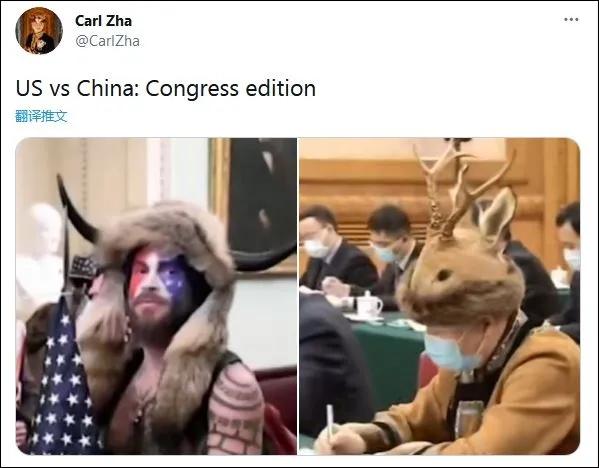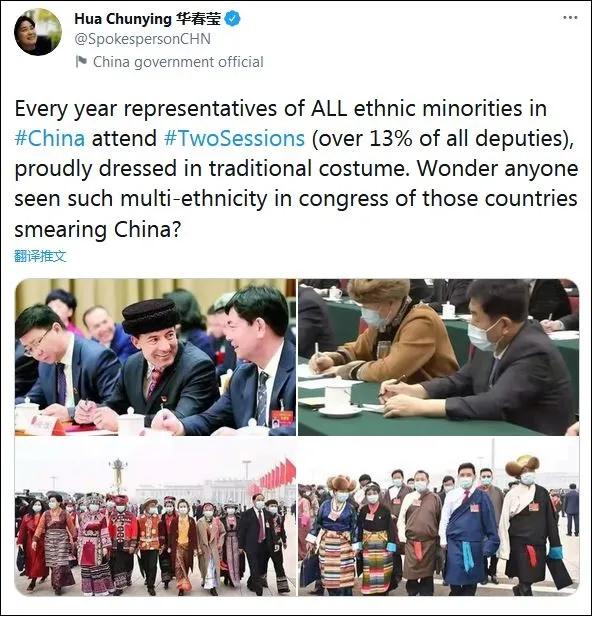

On March 8, Twitter user Carl Zha posted a combo photo and captioned it with the words "US vs China: Congress edition". The tweet prompted heated discussions over the totally different fates of two men - one a white American wearing indigenous clothing to try to look more authentic, the other a Chinese representative of his ethnic group wearing a traditional roe deer hat.

The American in the left photo wearing a furry hat is Jacob Chansley, who was arrested after storming the U.S. Capitol, while the man in the right picture is Dai Xiyuan from the Oroqen ethnic group, who was seen attentively taking notes at a plenary meeting of the delegation from north China's Inner Mongolia autonomous region during China's "two sessions", a key event on China's political calendar.
According to Dai, the roe deer hats are no longer being made, as the animal has been put under level-two state protection and has become an intangible cultural heritage item in China.
The photo also served as a vivid rejection of the groundless accusation of "genocide" against ethnic minorities in China fabricated by certain Western politicians and media outlets. Some net users claimed that what the U.S. did to native Indians constitutes actual genocide.
On March 8, Chinese Foreign Ministry spokesperson Hua Chunying posted a tweet that said: "Every year representatives of ALL ethnic minorities in #China attend #Two Sessions (over 13% of all deputies), proudly dressed in traditional costume. Wonder anyone seen such multi-ethnicity in congress of those countries smearing China?"

In fact, the Oroqen ethnic group has not only kept its traditional culture, but also embraced improving livelihoods with the help of the central government. As China's last hunting society, the Oroqen ethnic group has undergone remarkable changes in its economic and social outlook over the past years.
From 1951 to 1958, the Oroqen people have become completely settled. Between 1958 and 1988, the Oroqen people began to engage in agricultural production and various types of businesses. In 1996, the Oroqen Autonomous Banner implemented a hunting ban, showing that they had completely abandoned their hunting lifestyle.

Since 2018, under the guidance of the targeted poverty alleviation policy, the banner has been getting rid of poverty. The former hunting society, which has lived in the mountains for generations, is gradually boarding the fast train of modernization, and has embarked on a new journey towards a well-off society in all aspects.
 Fire brigade in Shanghai holds group wedding
Fire brigade in Shanghai holds group wedding Tourists enjoy ice sculptures in Datan Town, north China
Tourists enjoy ice sculptures in Datan Town, north China Sunset scenery of Dayan Pagoda in Xi'an
Sunset scenery of Dayan Pagoda in Xi'an Tourists have fun at scenic spot in Nanlong Town, NW China
Tourists have fun at scenic spot in Nanlong Town, NW China Harbin attracts tourists by making best use of ice in winter
Harbin attracts tourists by making best use of ice in winter In pics: FIS Alpine Ski Women's World Cup Slalom
In pics: FIS Alpine Ski Women's World Cup Slalom Black-necked cranes rest at reservoir in Lhunzhub County, Lhasa
Black-necked cranes rest at reservoir in Lhunzhub County, Lhasa China's FAST telescope will be available to foreign scientists in April
China's FAST telescope will be available to foreign scientists in April "She power" plays indispensable role in poverty alleviation
"She power" plays indispensable role in poverty alleviation Top 10 world news events of People's Daily in 2020
Top 10 world news events of People's Daily in 2020 Top 10 China news events of People's Daily in 2020
Top 10 China news events of People's Daily in 2020 Top 10 media buzzwords of 2020
Top 10 media buzzwords of 2020 Year-ender:10 major tourism stories of 2020
Year-ender:10 major tourism stories of 2020 No interference in Venezuelan issues
No interference in Venezuelan issues
 Biz prepares for trade spat
Biz prepares for trade spat
 Broadcasting Continent
Broadcasting Continent Australia wins Chinese CEOs as US loses
Australia wins Chinese CEOs as US loses